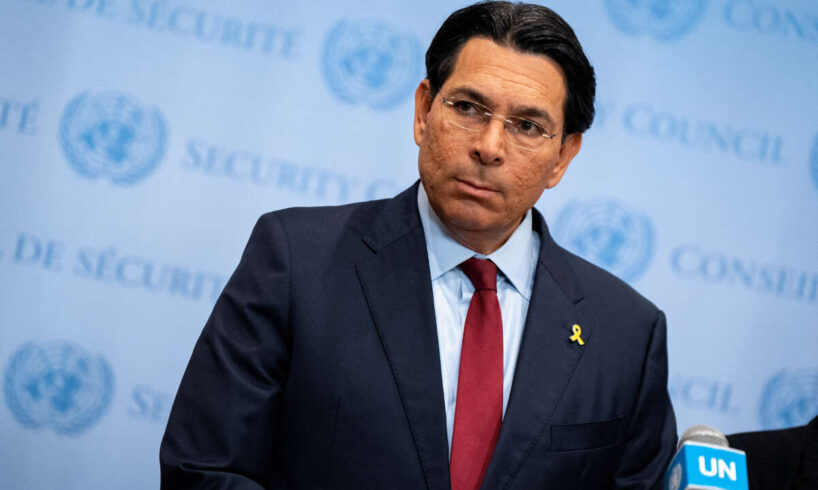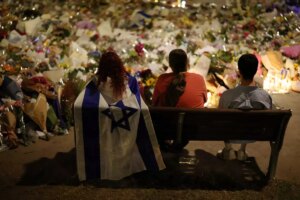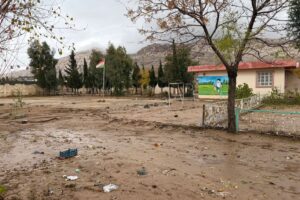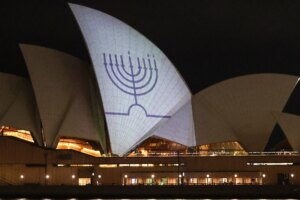
Forty-eight hours after Israel’s targeted strike on Hamas leaders in Doha, the UN Security Council swiftly convened an “emergency session,” unanimously issuing a press statement condemning the Israeli action and affirming Qatar’s inviolable sovereignty and territorial integrity.
Israeli Ambassador Danny Danon brought the Security Council chamber to a boil, besting his Pakistani counterpart in a fiery exchange. At the outset of the Security Council session, Prime Minister Mohammed bin Abdulrahman Al Thani, who flew in for the auspicious occasion, accepted an outpouring of international solidarity that was effusively expressed by member states.
Danon, unmoved, challenged the room’s selective outrage: “Where was your indignation on October 7, when our sovereignty was breached and Israeli civilians were butchered by Hamas? What have we heard from this Council since then? Silence, silence.” Danon reminded the Security Council that it was ironically convening on the 24th anniversary of 9/11: “Today, the world remembers the devastating terrorist attacks of September 11th. That tragic day, like October seventh for Israel, was a day of fire and blood. In the aftermath of 9/11, the countries that uphold freedom, equality, and democracy in this council stood shoulder to shoulder. Two weeks later, this council adopted Resolution 1373. It said plainly: no state may harbor terrorists, no state may give them safe haven. Any government that does so breaks this Council’s binding obligations”.
Danon’s invocation of the US felling the mastermind of 9/11 on Pakistani soil struck a raw nerve with Pakistan’s delegation, launching a fiery exchange that stunned the hushed Council: “When bin Laden was eliminated in Pakistan, the world did not ask why a terrorist was targeted on foreign soil – but why he was sheltered there in the first place. There was no immunity for bin Laden, and there can be no immunity for Hamas.’
Danon shone a much-needed spotlight on the selective outrage in international forums; no condemnation was issued against the US for violating Pakistani sovereignty, yet Israel is routinely censured for striking at recognized terror operatives, even when they operate with state protection. What happened next revealed just how exposed Pakistan felt by Danon’s withering comparison of Israel’s Doha strike to the bin Laden raid and his indictment of the Council’s selective memory.
Pakistan’s rebuttal
Visibly unsettled, Pakistan’s envoy Asim Iftikhar Ahmad requested additional time after all council members had spoken. He shot back, dismissing Danon’s analogy: “It is unacceptable, indeed ludicrous, for an aggressor and occupier, a serial violator of the UN Charter and international law that is Israel, to abuse this chamber and disrespect the sanctity of this Council.” He lashed out further: “Israel is the perpetrator of the worst kind of state terrorism that we are witnessing in Gaza and in fact in the occupied Palestinian territories for decades. The world sees your double standards.”
Danon reframed the issue before the Council and cut through Ambassador Ahmad’s self-righteous facade like a laser beam: “You cannot change the fact that 9/11 happened, and you cannot change the fact that Osama bin Laden was in Pakistan and was killed on your territory. When you criticize us… think about the standards you apply to your country and the standards you apply to Israel….When bin Laden was eliminated in Pakistan, the question asked was not ‘Why target a terrorist on foreign soil?’ The question was, ‘Why was a terrorist given shelter at all?’ Don’t lecture Israel about self-defense until you hold yourselves to the same standards.”
Indeed, Pakistan’s hospitality, witting or unwitting, allowed the world’s most-wanted terrorist to live in comfort for years, yards from military installations – a fact the global community conveniently ignored when they criticized Israel’s similar operation.
Make no mistake, the Danon-Ahmad exchange was more than the usual diplomatic theater; it laid bare the double standards underlying much of the Security Council’s debate on counterterrorism and national self-defense. Indeed, the heated back-and-forth, sparked by Israel’s operation, is emblematic of the hypocrisy that has plagued recent Security Council press statements condemning Israel while ignoring, or even tacitly excusing, equally or more controversial counterterror operations by other nations.
Danon’s remarks were not only a defense of Israeli policy but a challenge to the Security Council’s near unanimity supporting or excusing identical conduct by others under the banner of “counterterrorism.” The contrast Danon highlighted is not theoretical; rather, it reflects an entrenched practice whereby Israel is uniquely held to impossible standards.
Article 51 of the UN Charter affirms that every state has the inherent right to self-defense if an armed attack occurs against it. Moreover, international law recognizes that self-defense against threats posed by non-state actors, like Hamas, extends beyond Israel’s borders when the host country is either unwilling or unable to prevent its territory from being used for hostile acts.
The broader farce
Danon’s Security Council exchange was more than diplomatic fencing – it exposed the core of the Council’s performance. Pakistan, publicly wounded, clung to principles of sovereignty and “legal order,” while Israel – by Danon’s own words – was fighting for its existence with the same tools the world’s superpowers have claimed for themselves.
As ambassadors traded formal statements and caustic barbs, it was Danon’s moral clarity and Pakistan’s subsequent outburst that made the true hypocrisy of this forum blindingly clear.
Institutionalized hypocrisy at the UN Security Council
Beneath the theatrics is the international community’s deeper malaise. While the UN solemnly condemns Israel for operations against orchestrators of violence, it rarely demands accountability from those who harbor, fund or excuse terrorism against Israelis. In the wake of the bin Laden raid, Pakistan indignantly protested a violation of sovereignty but received only muted and formulaic expressions of concern from the Council. No resolution, no press statement, no emergency session was ever invoked to censure the United States; the world simply accepted the logic that where states fail, others may summon the will to act. The same principle was accepted for other member states fighting terrorism – except Israel.
Such hypocrisy has only deepened over time. Recent UN press statements “condemning Israel” over targeted strikes or forceful countermeasures are typically authored or championed by states that themselves have cheered – publicly or privately – when terror leaders like bin Laden were hunted down by other powers. The hypocrisy is “rank,” as one Israeli deputy ambassador put it, because it demands of Israel a renunciation of its right to self-defense that no UN member would ever accept for their own country.
The persistence of this bias, as Danon and others have charged, is more than rhetorical. It warps both the legitimacy of the UN and the prospects for any honest debate about international law and norms. Criticism of Israeli actions is not inherently unjustified – but when such criticism is meted out with manifestly different criteria, it undermines the Council’s credibility and emboldens bad actors who know the world’s outrage is highly selective.
The Danon-Ahmad confrontation should stand as a warning. Until the world’s leading deliberative body can address terrorism and self-defense without fear or favor, its pronouncements will continue to ring hollow. The real victims of this hypocrisy are not only Israelis and Palestinians but the entire mission the Security Council purports to uphold.
Eve Epstein, Ph.D., is the founder and principal of Epstein & Associates, a strategic communications and media management firm located in New York City. She has advised a two-term UN Secretary General and other top UN officials throughout the Secretariat and related UN agencies.





